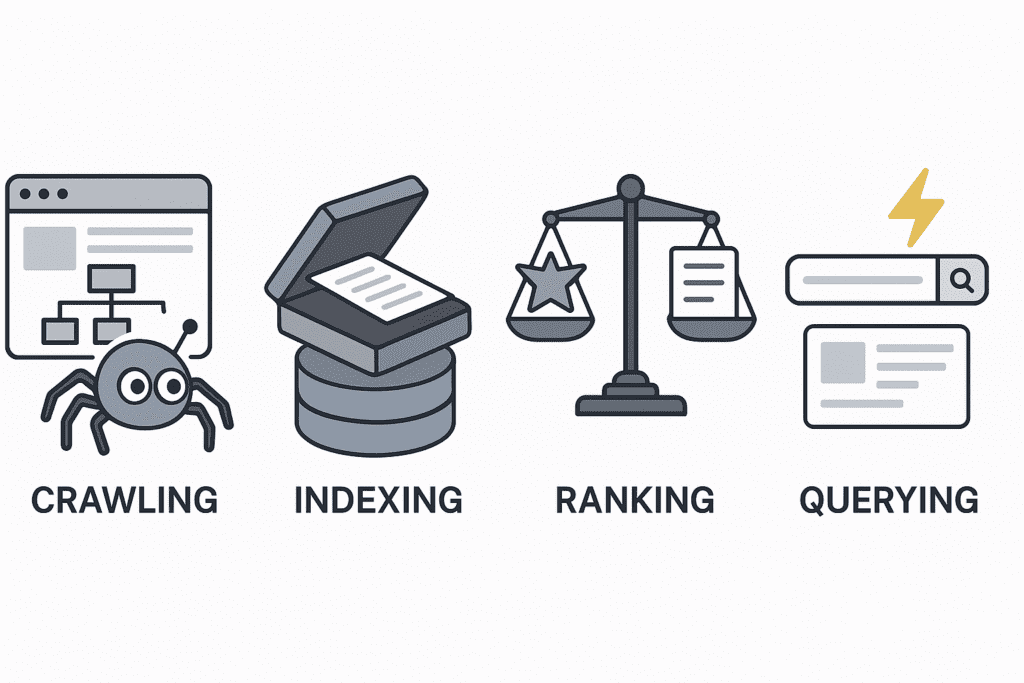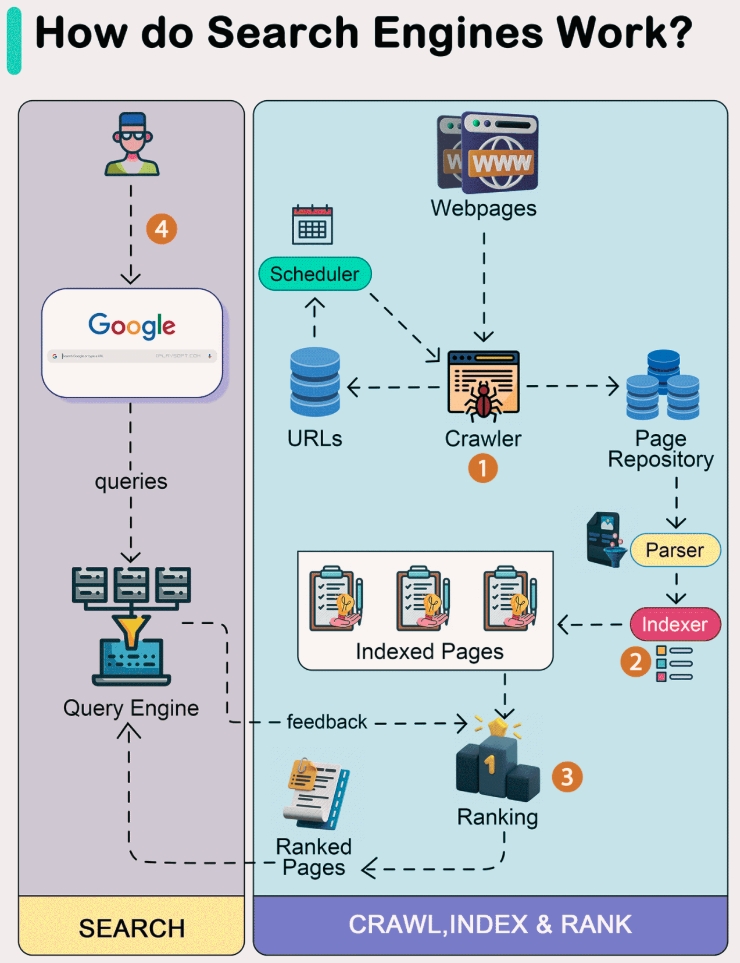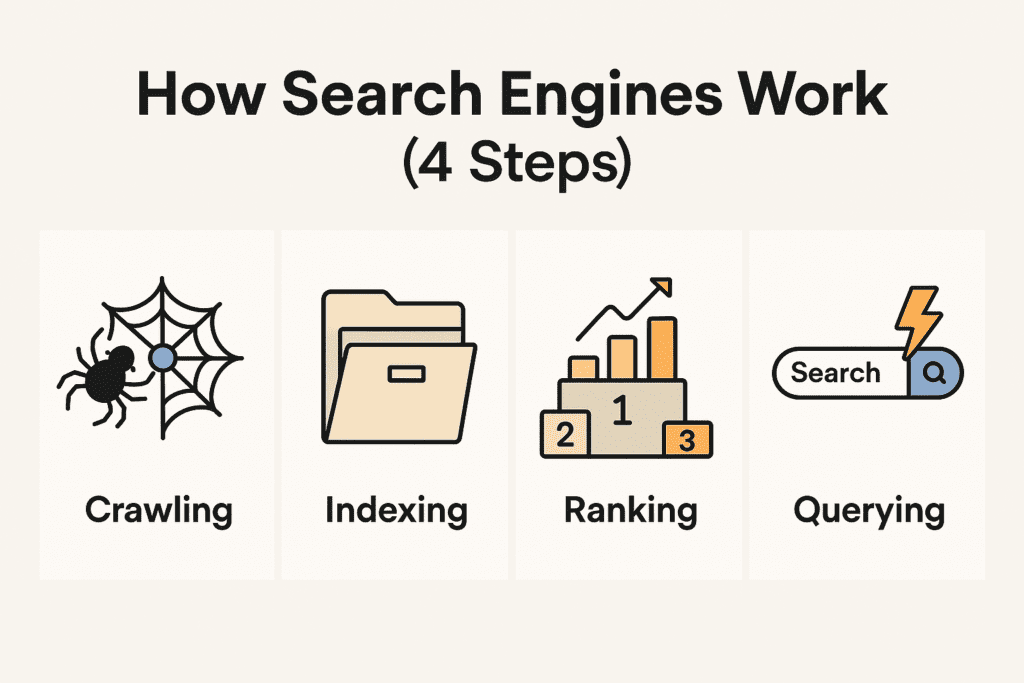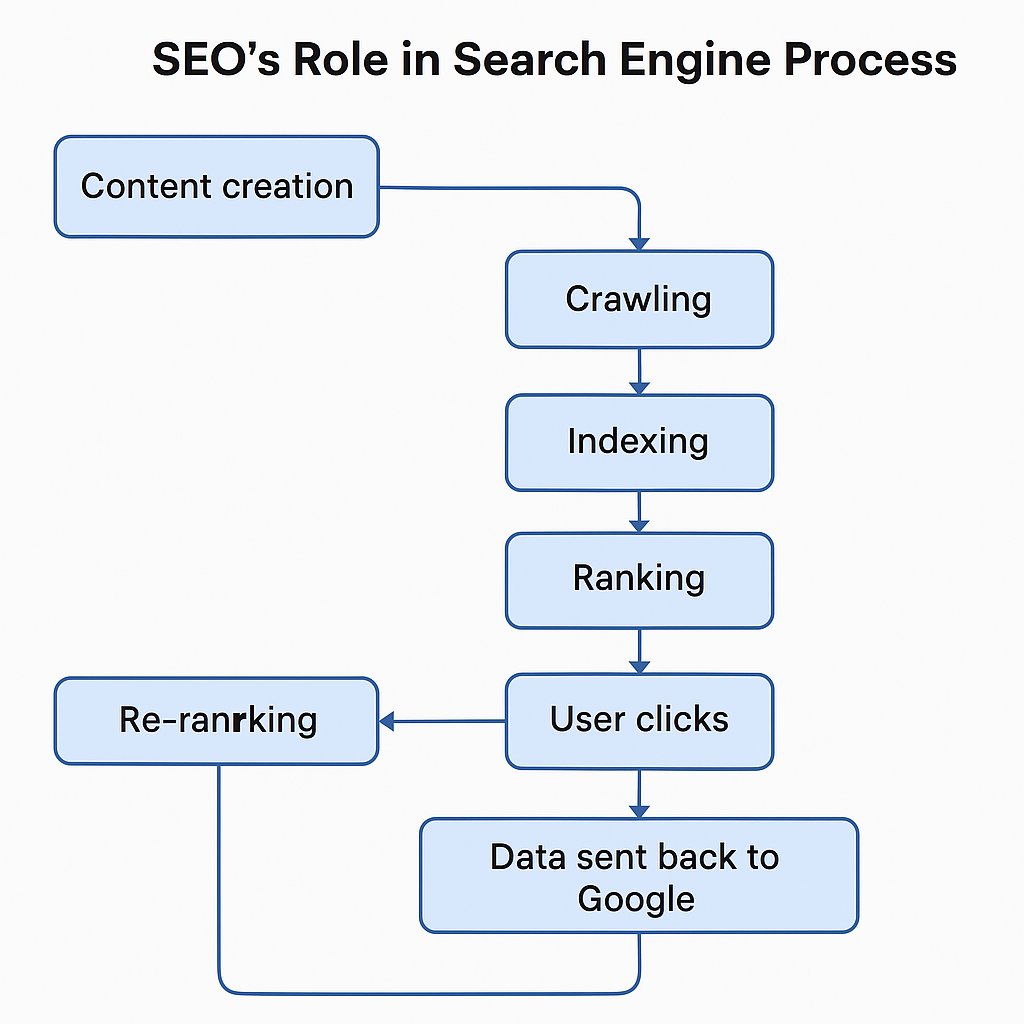I still remember the first time I Googled “best tacos near me” and got a list of spots so spot-on I thought the internet was psychic. Seriously, how does it do that? With billions of websites floating around, how does Google pick the perfect ones in, like, a split second? For the longest time, I figured it was some tech wizardry—maybe a bunch of brainiacs at Google sifting through the web like it was their day job. Spoiler alert: it’s not magic, but it’s a crazy-smart system that’s been worked on for years, and I’ve spent way too much of my life trying to crack it.
If you’re wondering how search engines work or how does SEO work on Google, you’re in the right spot. I’m not a coder or a tech guru—just a marketer who’s been at this for 15 years, making mistakes and learning how to get my sites noticed. I’m going to lay it all out for you, no fancy terms, just the stuff I wish I’d known when I started. By the time you’re done, you’ll understand how Google search works, why SEO is a big deal, and how to use it to get your blog, business, or random side project out there. Got questions like what is SEO and how does it work or how SEO works for business? I’ve got you covered. Let’s jump in and figure this out together.
Table of Contents
What’s a Search Engine? My Half-Caffeinated Take
Alright, let’s start with the basics, because I don’t want to lose you before we even get going. A search engine—think Google, Bing, or that privacy-obsessed DuckDuckGo—is like the internet’s most stressed-out librarian. You toss it something like how does SEO work, and it scrambles through a bajillion web pages to find ones that match. Then it sorts them into a nice little list, all before I can finish my coffee.

But here’s the thing: it’s not just blindly digging through pages. There’s a method to it, and it boils down to four steps—crawling, indexing, ranking, and querying. It’s like a coffee shop where every step, from picking the beans to steaming the milk, has to work just right. I’ve spent years poking at this system, and I’m going to break it down so you can see how search engine optimization works from the inside out. Trust me, once you get it, it’s like seeing the Matrix.
Why You Should Care (It’s About Not Being Invisible)
Why bother figuring out how Google search works? Because if you’ve got a website—maybe a blog about your dog’s tricks or a shop selling quirky mugs—this is how people find you. Google’s like the bouncer at the internet’s coolest club. I read somewhere that over 70% of clicks go to the first page of results, and if you’re not there, you’re basically shouting into the void.
For my own site, I’m all about AI marketing and growth hacks. Knowing how SEO works in digital marketing helps me show up when people search for stuff like “AI tools for business.” Whether you’re a small business owner, a hobbyist blogger, or just someone with a wild idea, understanding how search engines work is your ticket to getting noticed. It’s not about gaming the system—it’s about making it easy for Google to see you’re worth showing off. Sound like something you want in on? Let’s keep going.
How Search Engines Work: The Four Steps I’ve Wrestled With
Here’s where we get to the meat of it. Search engines have a four-step process that’s been tweaked to death to give you answers faster than I can burn my toast. I’ve messed up at every one of these steps over the years, so let me walk you through them like we’re grabbing a coffee and hashing it out.
Step 1: Crawling – Google’s Snooping Around the Web

First off, search engines have to find all the stuff on the internet. They use these little programs called crawlers—or “spiders,” which I’ll admit gives me the heebie-jeebies, but they’re not actual bugs. These crawlers are like nosy neighbors, bouncing from page to page, following links to sniff out new stuff.
Think of the web as a giant, messy neighborhood. Links are the sidewalks, and crawlers are wandering around, starting at big spots like Wikipedia or ESPN. They stumble onto your blog post about “How to Make the Perfect Latte,” follow your link to a coffee maker review, then keep going to whatever’s next. They never stop—24/7, they’re finding pages, images, videos, you name it.

Here’s something I figured out after a few headaches: crawlers aren’t just roaming free. There’s a scheduler that tells them where to go and when. Big sites like CNN might get checked daily, but your little blog might only get a visit every few weeks—unless you’re posting new content like it’s your job.
That’s why I’m always banging on about fresh content—it’s like leaving a trail of breadcrumbs for Google. I also learned that submitting a sitemap through Google Search Console—totally free—makes it way easier for crawlers to find your stuff. It’s like handing them a map with a big X on your site.
Step 2: Indexing – Organizing the Internet’s Chaos
So, the crawler’s found your page—now what? It doesn’t just shrug and move on. Indexing is where the search engine actually digs into your page and sticks it in a giant digital organizer, kind of like my attempt to sort my desk drawers (spoiler: it never lasts).
Here’s how I picture it: the crawler hands your page to this thing called a parser, which is like a nerdy librarian who reads everything. It’s checking out your text, images, even the messy code behind the scenes to figure out what your page is about. If you’ve got a post called How Does SEO Work on Google, it’ll notice keywords like “SEO,” “Google,” and “work,” peek at your headings, and see if your content’s fresh or some crusty old thing from 2010.
Then it files all that away in an index—a huge, super-organized database. If your page is about SEO, it gets tucked under “SEO,” “search engine optimization,” and other related terms. That way, when someone searches how does search engine optimization work, Google knows your page might be a contender. But here’s the part that bit me in the butt early on: not every page gets indexed.
If your site’s got broken links, takes forever to load, or has the same content copied in three places, Google might just skip it. I had a blog post vanish from results once because of a stupid typo in my code—now I use tools like Screaming Frog to catch that kind of thing before it tanks me.
Step 3: Ranking – Who Gets to Be the Star?
Now we’re at the part everybody’s obsessed with: ranking. This is where Google decides who’s the best and lines them up like contestants on a talent show. It’s not random, and it’s not just about who showed up first—it’s all about algorithms, those annoying rules that decide who’s a winner and who’s going home.
Say someone searches how SEO works step by step. Google grabs millions of indexed pages that might fit, then sorts them based on stuff like:
- Relevance: Does your page actually explain SEO steps? If it’s about puppy training, you’re out of luck.
- Quality: Is your content legit, or just a bunch of hot air? Google loves pages that dive deep—think 1,000+ words of real talk.
- Authority: Do other sites link to you? If places like Forbes or Moz give you a shoutout, that’s like a backstage pass.
- Freshness: Newer stuff often trumps older posts—unless the old one’s a classic that people still love.
- User Experience: Is your site fast? Does it play nice on phones? If it’s a slog to load, you’re done for.
- Personalization: Where you are or what you’ve searched before might nudge the results—like showing you coffee shops in your town.
Google’s got something like 200 factors in its algorithm—makes my head spin—and they’re always tweaking it. I’ve had my site drop a few spots overnight because I wasn’t keeping up with mobile speed. The big takeaway? Google wants to show the best pages, period. That’s where SEO how it works comes in—it’s about making your site impossible to ignore.
Step 4: Querying – Why Answers Feel Instant
This is the part you notice: you hit enter, and poof—there’s your list of results. Behind the scenes, it’s like a high-speed chase. The query engine dives into the index, pulls out pages that match your search, and runs them through the ranking gauntlet—all in less time than it takes me to realize I forgot my coffee order.
You’ll see a mix of things: organic results (the ones ranked naturally), maybe some ads (that’s how Google paid search works), and sometimes cool extras like featured snippets—those answer boxes at the top. If your page nails what is SEO and how it works, it might land in a snippet, and let me tell you, that’s like winning the internet lottery for clicks. One thing I’ve learned: Google’s always watching what people do with results. If folks click your page and bounce right back, you might slip. If they hang out, you’re climbing. It’s like the web’s got a scoreboard, and you’re always playing.

SEO: My Battle-Tested Tricks to Get Seen
So, how does SEO work with all this? SEO—search engine optimization—is like your playbook for getting on Google’s good side. It’s not about sneaking past the refs; it’s about playing so well they can’t help but notice you. Here’s how I break it down, based on way too many late nights tweaking my sites:
- Make Crawling Easy: Use a sitemap and clean links so crawlers don’t get lost. I once blocked half my site by accident—never again.
- Get Indexed Properly: Write clear content with keywords like how does SEO work on Google. Good headings and fresh updates are your friends—I try to spruce up old posts every few months.
- Rank Better: Write killer content that’s worth reading, get other sites to link to you, and make your site fast. Backlinks from big names are tough to score, but they’re gold.
- Win at Queries: Figure out what people are searching—like how SEO works for business—and give them answers they’ll stick around for. I use Google’s autocomplete to snoop on what people want.
For my site, I lean on SEO to rank for things like “AI marketing tips.” It’s the same deal for you—whether you’re blogging about gardening or selling handmade candles, SEO’s how you get in front of people. It’s not a quick fix, but it’s worth every second you put in.
A Real-Life Win: How I Saved My Friend’s Coffee Shop
Let me tell you about my buddy Alex. He runs a coffee shop in my neighborhood, and a couple of years ago, his website was nowhere to be found on Google—like, page 6 for “best coffee near me.” He was so bummed—he’d poured his heart into his site, but nobody was seeing it. I offered to help, and we went full-on SEO mode.
We started with crawling. His site didn’t have a sitemap, so we made one and sent it to Google Search Console—took maybe 15 minutes. For indexing, we added new pages about his coffee blends, with photos and keywords like “organic coffee near me.” We also hit up a few local food bloggers to link to his site, which gave him some street cred. And we fixed his site’s speed—his old hosting was slower than a Monday morning.
The game-changer was targeting what people were searching for. We wrote a blog post called “Why Our Coffee’s the Best for Your Morning Grind,” stuffed with tips and stories about his shop. It answered exactly what his customers were asking Google, and it snagged a featured snippet.
Four months later, he was on page 1. His traffic tripled, and he started getting orders for beans from people across town who’d never stepped foot in his shop. That’s how SEO works in digital marketing—it’s not just numbers; it’s real people finding you.
Screw-Ups I’ve Lived Through (Learn from My Pain)
I’ve made every mistake in the book when it comes to SEO, and I’ve seen others crash and burn too. Here’s what you’ve got to avoid:
- Blocking Crawlers: I once tweaked my robots.txt file wrong and told Google to skip half my site. Check yours twice—trust me.
- Keyword Overkill: Stuffing “SEO SEO SEO” everywhere just makes you look like a spammer. I tried it once, and Google was not amused.
- Slow Sites: If your site’s a snail, nobody’s waiting around—not even Google. PageSpeed Insights is my lifesaver now.
- Lame Content: A 300-word post isn’t going to cut it. I learned that after a blog post I thought was brilliant got ignored—now I go deep or don’t bother.
Alex had his own flub—he’d copied his “About Us” page onto three different parts of his site. Google saw it as duplicate content and ditched it. We rewrote everything to be unique, and his rankings came roaring back.

Your Next Move: Getting Started Without Losing Your Mind
So, how search engines work isn’t some big mystery anymore, right? Crawling, indexing, ranking, querying—it’s a system you can totally get a handle on. If you’re itching to start, here’s what I’d do first:
- Pop into Google Search Console and make sure your site’s crawlable—it’s free and takes no time.
- Write a beefy post targeting something specific—like how does Google SEO work—and make it so good people can’t stop reading.
- Run your site through PageSpeed Insights and fix anything dragging it down.
These little moves add up, and before you know it, you’re climbing Google’s ranks. Got a question about where to begin? Leave it in the comments—I’m all ears. Your spot on page 1 is out there, and I’m rooting for you to grab it.
FAQs: Straight Answers to Your Questions
How does Google search work?
Crawls the web, indexes pages, ranks them, and serves results—fast!
What is SEO and how does it work?
It’s optimizing your site to rank higher by being crawlable, relevant, and user-friendly.
How does Google paid search work?
Ads bid on keywords and appear above organic results—pay-per-click style.
How does SEO work for business?
Drives traffic, builds trust, and boosts sales by getting you seen.
External Links
- Google Search Central – Google’s own guide to crawling, indexing, and ranking.
- Moz’s Beginner’s Guide to SEO – A friendly intro with visuals and examples.
- Search Engine Journal – Updates and tips to stay on top of SEO.
Key Takeaways
- Search engines crawl, index, rank, and query—four steps you can work with.
- SEO’s your way to stand out—make Google love your site with awesome content and speed.
- Quality, links, and user experience are your ticket to the top.
- Start small, keep at it, and watch your site rise!






